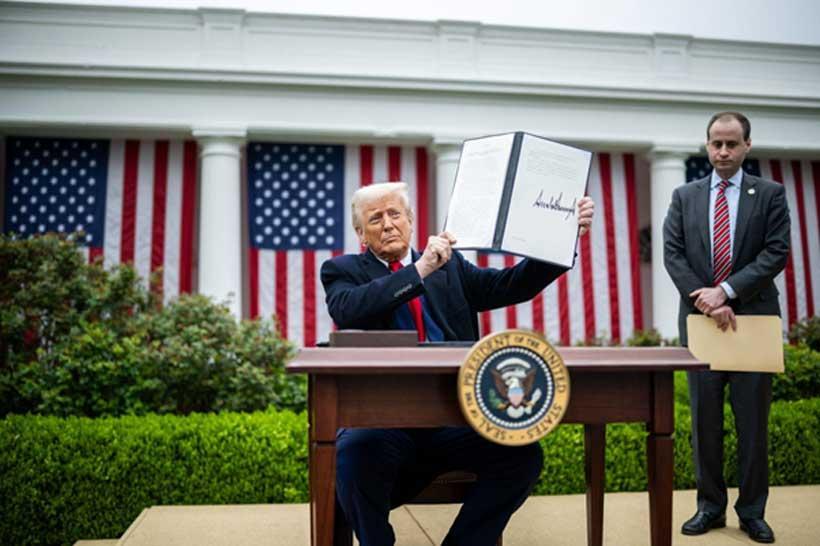By
Gule Zahra
Africa-Press – Mauritius. President Donald Trump has launched an aggressive wave of protectionist policies marking a dramatic shift from decades of US support for free trade and multilateralism. According to the Trump administration, these policies aim to revive domestic manufacturing, reduce trade deficits and address intellectual property theft. However, the wave of U.S. tariffs is also a strategic maneuver reflecting the convergence of geopolitical rivalry, employment of populist rhetoric and weaponization of economic policy. States are now grappling with the pressing question of how they are going to shape their economic policies in response to the tariffs implemented by the US.
Trump’s tariff policies have wide ranging global implications. The actions of emerging powers have become increasingly significant for the geopolitical landscape, as these states are now playing a pivotal role in shaping global trade and economy. Therefore, it is crucial to analyze how these powers are responding to the tariffs. For this, it is essential to begin by establishing which powers fall into the category of middle powers. The Belfer Center for Science and International Affairs, a research center at the Harvard Kennedy School, has classified India, Brazil, Indonesia, Türkiye, Vietnam and South Africa as ‘middle powers’. The institute has highlighted the increasingly geopolitical, strategic, economic importance of the states as part of its ‘Middle Powers Project’.
India’s Response: Diplomatic Restraint
Starting with India, the state has shown restraint in response to Trump’s tariffs, prioritizing diplomatic channels to address the issue. The state is actively pursuing a bilateral trade agreement with the US. In February, 2025, India had implemented significant tariff reductions on US imports including reduction in import duties on high end motorcycles, elimination of custom duties on lithium-ion batteries etc. No concrete retaliatory tariffs have been implemented by the state against the US.
Indonesia’s Response: Conciliatory Approach
An analysis of Indonesia’s response reveals a conciliatory approach. In April 2025, Indonesia’s Chief Economic Minister Airlangga Hartarto in a statement affirmed that Indonesia is focused on preserving bilateral trade relations. In August 2025, the state entered into a trade agreement with the US, eliminating tariffs on approximately 99% of U.S. goods. Moreover, to counteract the economic impacts of the tariffs, Indonesia has introduced a $2 billion stimulus package for the Christmas season which aims to bolster domestic consumption.
Türkiye’s Response: Pragmatic Opportunism
As intriguing as it may seem, Türkiye’s response has been that of pragmatic opportunism. Vice President Cevdet Yilmaz in a statement expressed that the baseline tariff of 10% on Türkiye could provide a comparative advantage to Türkiye as it is lower than those imposed on other countries.
Trade Minister Ömer Bolat has expressed the state’s goal of targeting sectors weakened by U.S. tariffs on competitors.
Vietnam’s Response: Proactive Diplomacy
Vietnam’s response to the tariffs has been one of proactive diplomacy. Shortly after the U.S. announcement of a 46% tariff on select Vietnamese exports in April 2025, the General Secretary of Communist Party of Vietnam Tô Lâm held phone talks with US President Trump. Moreover, the state cut import duties on several key U.S. products, including technological components and agricultural commodities. In addition, Vietnam has pledged to import more US products and implement stricter origin verification policies on products.
South Africa’s Response: Building Economic Resilience
South Africa’s response too reveals a preference for diplomacy over retaliation. South Africa continues to engage with the United States to address the 30% reciprocal tariffs imposed by the Trump administration. Moreover, the state has implemented measures such as Localization Fund Support and block exemption for companies to build their capacity and competitiveness. In addition, South Africa is accelerating market diversification to reduce dependence on US markets.
Brazil’s Assertive Response
Brazil’s response to Trump’s policies is assertive. The country has enacted the Trade Reciprocity Law that allows the government to adopt commercial measures against countries that impose unilateral barriers on Brazilian products. Furthermore, the state has unveiled a “Sovereign Brazil” relief plan worth about US$5.5 billion to support exporters hit by tariffs.
Across the board, the emerging powers have signalled a preference for dialogue and negotiation rather than tit-for-tat escalation. In addition, the states have asserted themselves as the defenders of multilateralism and trade liberalization. Moreover, in order to adapt to the evolving global trade system, the states have moved towards implementation of structural reforms and provision of support to domestic industries. In conclusion, despite differing national contexts, the states’ responses are marked by a common thread of strategic balancing between defending national economic interests and preserving a relationship with the United States. This approach is a viable and realistic course of action. As the United States remains a key player in the global economy, a confrontational or retaliatory approach is not advantageous for long term economic goals. Rather, the states should focus on trade diversification, strengthening regional cooperation and building resilience of local industries. With foresight, the states can effectively adapt to the changing global economic dynamics.
moderndiplomacy
For More News And Analysis About Mauritius Follow Africa-Press







